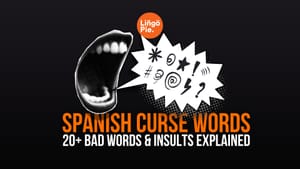Money makes the world go round, but the words we use to talk about it? That's where things get interesting. From Gen Z's "secure the bag" to Britain's timeless "bread," every English-speaking culture has developed its own creative ways to discuss cash.
Whether you're watching an American TV series, binge-watching British shows, or exploring Australian content, understanding money slang can be the difference between feeling lost and truly connecting with what's happening on screen.
So in this post, let's explore the colorful world of money slang across the English-speaking world.
- Swiss German And German Language: 5 Major Differences
- What’s The Best Way To Learn Spanish? [5 Best Tips]
- What’s The Best Way To Learn Dutch On Your Own?

Why Money Slang Matters for Language Learners
Money talk appears in virtually every form of entertainment. From casual conversations about splitting bills to dramatic scenes involving financial stakes, these terms are everywhere. Missing their meaning can leave gaps in your comprehension.
More importantly, money slang often reflects cultural attitudes. For instance, it shows Gen Z's entrepreneurial terms, Britain's historical references, and Australia's playful creativity.
Gen Z Slang For Money
Generation Z has brought fresh energy to money slang, blending traditional terms with new digital-age expressions. These terms often carry an entrepreneurial spirit that reflects their approach to finances.
- Guap (pronounced "gwop") – A large sum of money, often implying serious cash flow. "She's making guap from her side hustle!"
- Secure the bag – To earn money or achieve financial success. It's become a motivational phrase beyond just getting paid. "Job interview tomorrow – time to secure the bag."
- Bands – Stacks of cash held together with rubber bands. Refers to having substantial physical money. "They made bands overnight selling those limited sneakers."
- Bread – Classic term for money that's experienced a Gen Z revival. Derives from money being essential for survival, like bread. "Let's get this bread!"
- Fetti – A newer variation meaning money, possibly derived from the Spanish "feria" or simply from "confetti" (scattered money). Popular in Bay Area slang.
- Stack/Stacks – Usually refers to $1,000 or multiple thousands. "A stack" specifically means $10K in some contexts.
- Bag – Your earnings or prize money. Can refer to anything from a single paycheck to a major financial win. "That sponsorship deal was a serious bag."
- Racks – Another term for thousands of dollars, popularized by rapper Yung Chris. "That car cost me three racks."

American Slang Terms For Money
American money slang has deep roots, with many terms crossing generations and social groups. These expressions remain popular across age groups and regions.
- Bucks – The most universal American slang for dollars. Originated from "buckskin," used as currency in colonial America. "Could you spot me twenty bucks?"
- Benjamins – $100 bills, named after Benjamin Franklin's portrait. Made famous by Puff Daddy's "It's All About the Benjamins."
- Dead presidents – Paper money in general, though not all bills actually feature presidents. The term sounds more dramatic than it is.
- Green/Greenbacks – References the color of U.S. currency. "Greenbacks" dates to the Civil War when the government used green ink to prevent counterfeiting.
- C-note – A $100 bill (C = 100 in Roman numerals). "She dropped a C-note on those shoes."
- Sawbuck – Originally a $10 bill, from the resemblance of the Roman numeral X to a sawhorse. Less common today.
- Dough – Money in general. Food-related money terms are common across cultures. "I need to save some dough for vacation."
- Cheddar – Another food-based money term. Origin debated, but it's been around since the early 1900s.
- Moolah – Popularized by jazz musicians in the 1930s. Still widely understood today. "She's got serious moolah."

British Money Slang
British money slang combines historical terms with modern expressions. The UK's rich monetary history means some slang dates back centuries, while newer terms keep evolving.
- Quid – The universal British term for pounds. Never pluralized ("five quid," not "five quids"). Possibly from Latin "quid pro quo."
- Fiver – A £5 note. Simple, effective, and universally understood across the UK.
- Tenner – A £10 note. Follows the same pattern as "fiver" and equally common.
- Bob – Originally a shilling (pre-1971 currency), but still occasionally used. Historical charm that persists in some regions.
- Nicker – Another term for a pound, less common than "quid" but still heard in casual conversation.
- Dosh – General term for money. Friendly and informal. "I'm running low on dosh."
- Smackers – Can mean pounds in general. "It cost me 50 smackers."
- Score – £20, not technically slang since "score" means twenty, but widely used. "Lend us a score?"
- Pony – £25. Less common but still appears in certain regions and contexts.
- Monkey – £500. Quite specialized but known among those familiar with larger amounts.

Australian Slang Terms For Money
Australians have turned money slang into an art form, creating nicknames based on the bright colors of their polymer banknotes. Their creativity knows no bounds.
- Prawn/Pink Lady – $5 note (pink colored). Multiple food-related nicknames show Australian humor.
- Blue Swimmer/Blue Heeler – $10 note (blue colored). "Blue Heeler" references the Australian cattle dog breed.
- Lobster/Redback – $20 note (red colored). "Redback" also references the dangerous Australian spider.
- Pineapple – $50 note (yellow colored). Universally known across Australia and the most beloved nickname.
- Watermelon/Granny Smith – $100 note (green colored). "Granny Smith" references the apple variety.
- Dollarydoos – General term for Australian dollars, popularized by The Simpsons but embraced by Australians.
- Budgie – Another term for the $10 note, referencing the blue color of budgerigar birds.
- Fairy Floss – Alternative name for the $5 note, referencing cotton candy's pink color.
- Banana – Sometimes used for the $50 note as another yellow reference.
Historical Money Slang Terms Worth Knowing
Understanding older money slang helps when consuming period content or classic literature.
- Shekels – Biblical-era coins, now used casually for any money. "I need to earn some shekels."
- Simoleons – American slang from the 1880s, origin unknown but possibly blending "Simon" and "Napoleon."
- Ducats – Originally gold coins, now used playfully. "Hand over the ducats!"
- Coppers – Small denomination coins, from their copper content in older currencies.
Money Slang Around the World
English money slang is just the tip of the iceberg. Every language has developed its own colorful ways to talk about cash, revealing fascinating insights into different cultures' relationships with money.
- Pasta – Used mainly in Spain, literally means "dough." Just like English, food metaphors are popular.
- Plata – Literally "silver," this is the universal term across Latin America. Works like "cash" in English.
- Lana – Popular in Mexico, literally means "wool." Comes from when wool trade made people wealthy.
- Fric – The most popular French slang for money, similar to "cash."
- Pognon – Another common money-related term in French, often translated as "dough" or "dosh." More slangy than "fric."
- Blé – Literally "wheat," another food reference from the French language."
- Kohle – Literally "coal." In the 19th century, coal was expensive and valuable, so having coal in German meant having money.
- Kröten – Literally "toads," but has nothing to do with frogs. Comes from "Groschen," an old German coin.
- Mäuse – Literally "mice" in German. Derived from Yiddish words for coins.
- Soldi – The most common Italian word for money, plural of "soldo," a medieval silver coin.
- Grana – Italian slang similar to English "dough." Also means the actual cheese!
- Quattrini – Means "penny," comes from "quattro" (four) in Italian because the original coin was worth four denari.
- Okane (お金) – The standard, polite term for money in Japanese. Uses the kanji for "gold" with an honorific prefix.
- Zeni (銭) – Slang term used by younger generations, has a playful, colloquial feel. More informal than the other options in Japanese.
Discover Money Slang In Other Languages
Feeling inspired to see how these money slang translates to another language?If you're interested to learn, then you better check out Lingopie! Lingopie is a language learning tool that lets you explore content in multiple languages. This means that you can watch your favorite TV shows and movies all while learning your target language!
Ready to discover money slang in other languages? Start learning with Lingopie today and explore how the world really talks about cash.


![30+ Modern English Slang Terms For Money [Guide]](/blog/content/images/size/w1200/2025/06/Slang-term-for-money.jpg)



![19 Best Spanish Series For Learning Spanish Fast [2026]](/blog/content/images/size/w300/2025/04/best-shows-to-watch-to-learn-spanish.jpg)
![How to Learn Spanish with News in Easy Spanish [Guide]](/blog/content/images/size/w300/2024/12/How-to-Learn-Spanish-with-News-in-Easy-Spanish.jpg)
![80 Spanish Love Words Every Romantic Should Know [Guide]](/blog/content/images/size/w300/2025/10/spanish-love-words.jpg)
